The position of Master of the Temple at Temple Church has been explicitly interlinked with the Middle Temple and the Inner Temple ever since the grant of Letters Patent in 1608 by King James I to the societies. These Letters Patent endowed the Inns the land of the Temple, where they had previously been tenants of the Crown, and gave them responsibility for the maintenance of the Church and its Master. In the decades following, fractures appeared in the relationship between the societies and the Master of the Temple while they negotiated the new dynamic, not aided by the acrimonious religious divides of the time. Tensions exploded during the Mastership of Dr Paul Micklethwaite, leading to litigation and outrageous behaviour as each party attempted to enforce their perceived rights.
Dr Micklethwaite’s relationship with the Temple began on a high note, giving no hint of the troubles ahead. He gave great satisfaction to both societies in the position of Lecturer at Temple Church, to which he was appointed in January 1627. He made such a positive impression among the membership that Mr Attorney Heath, on behalf of both Inns, made a request to King Charles I that that Dr Micklethwaite be appointed in the place of Dr Thomas Master, the Master of the Temple at the time, as ‘the whole body of the Society are taken with him’. The position became vacant on the death of Dr Master in 1628 and Dr Micklethwaite was appointed the Master of the Temple by the King.
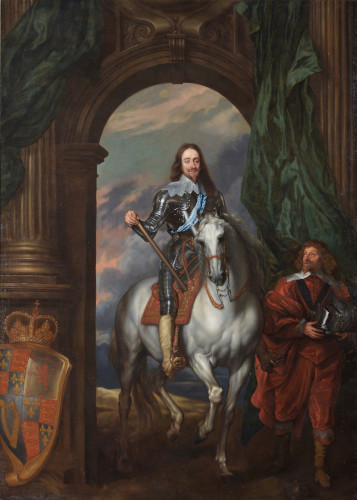
Portrait of King Charles I
Dr Micklethwaite began his tenure on a sour note by interfering in a matter of contention between the two Inns that had long been considered settled. In 1620 the Middle Temple and the Inner Temple had been in dispute over the order of precedence in which members of the societies should be given Communion – whereas it had been usual to begin sometimes with one and then on other occasions with the other, Dr Master had begun to administer Communion first to the Inner Temple on all occasions. The case was decided by the Lord Chief Justice of the King’s Bench with the co-operation of the Benchers of both Inns, and it was ordered that ‘it not fit to allow any Inn of Court precedence or pre-eminence over another’. However, in November 1628, a couple of months into his Mastership, Dr Micklethwaite refused to adopt the compromise agreed between the Inns and asked that the question of precedence be settled. The Benchers of the Inns conceded to the Master’s authority in religious matters and agreed that he should decide the order in which he gave Communion.
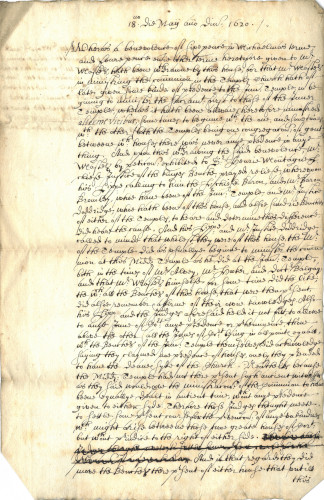
Order of the Judges concerning the dispute over precedence given by the Master of the Temple to Inner Temple in receiving Communion, 18 May 1620 (MT/15/TAM/43)
The societies were responsible under the 1608 Letters Patent for providing the Master of the Temple with an annuity of £17 6s 8d, a pension of £20 and a convenient dwelling place. Certain additional payments were allowed by the government of the Inns to the previous Master that had not been intended to last beyond his Mastership, but to which Dr Micklethwaite also considered himself entitled. In 1609, the Inns had granted the then Master the rents of the newly purchased Parsons Court as a gift, but he had caused consternation by considering the rents as his right, ‘which the Masters of the Bench mislike’. He was also given a ‘good will’ payment of 18d from each gentleman of the Society with the explicit statement that ‘no further payment will be made to his successors but only the £37 6s 8d and the lodging, till further order’. Dr Micklethwaite was evidently unhappy with the withdrawal of money that had been granted to his predecessor, and both societies were soon making additional payments to him. In the first half of 1639, both Inns granted him ‘one-off’ payments of £20 and £30, and the Middle Temple ordered that the temporary ‘good will’ payment of 18d. per gentleman continue to the new incumbent. This payment, originally instated for the tenure of one Master of the Temple, persisted in the Middle Temple’s ledgers until the 19th century.
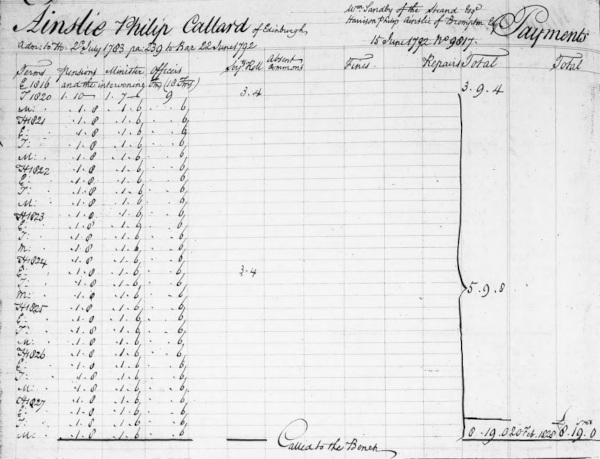
Entry in the Barristers Ledger showing that the payment by every member to the Master of the Temple (or Minister) of 18d, or 1s 6d, persisted two centuries after the Mastership of Doctor Micklethwaite, c.1830 (MT/3/BAL/5)
Any bad feeling created by the disputes over the Master’s salary was soon dwarfed by that engendered by his view that the Master of the Temple had precedence over all others in the Temple. Relations soured considerably when Dr Micklethwaite attempted to enforce a non-existent right to dine in the halls of the societies and do so with precedence over all others dining there. An order of the Middle Temple dated 16 October 1629 attempted to clarify matters and stated ‘[Dr Micklethwaite] neither hath… any place in the Middle Temple Hall, nor right to any manner of meat, or drink, or diet whatsoever… [but] by way of courtesy only and guestwise as he shall in term times happen to be invited, have a place in the chair at the upper end of the Bench table’. This order may have upset the Master as several weeks later he acted outrageously at the Inner Temple Hall. On All Saints Day in November 1629, a Grand Day, he removed the customary gold embroidered purse laid opposite the Lord Keeper of Coventry’s place on the Bench Table, turned his Lordship out, usurped his place, and then proceeded to say Grace. The Benchers immediately objected to these actions, stating that his presence there was a courtesy and not a right. He was ordered to ‘forbear the Hall till he was sent for’, a ringing set-down that cast the Master in the role of a servant, contrary to his high opinion of his own position.
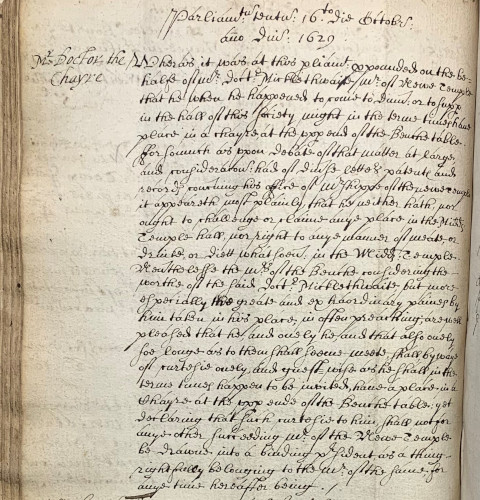
Order of the Middle Temple Parliament regarding Doctor Micklethwaite dining in Hall, 16 October 1629 (MT/1/MPA/5)
It was around this time in 1629-1630 that Doctor Micklethwaite began litigation against the two societies. Papers produced during the course of the litigation list fifteen grievances put forth by the Master. His prime complaint was that his precedence within the Temple was denied to him, and he considered himself the Master of the House and not just Master of the Church. This point was strenuously investigated and denied by the societies, and they produced many pages of documentation in the cause of proving that the precedence of the Master of the Temple ended with the dissolution of the Templar Order in 1312. These papers include interesting discussions about the history and administration of the Temple, including explorations such as the Master having no claim to any of its properties ‘By reason of the office as Master of the Temple to whom he pretends himself. Let him express himself whether he claim to be [Master of the Knights Templar] or no, if yea, by their rule of the order he must be a knight of the same profession’.
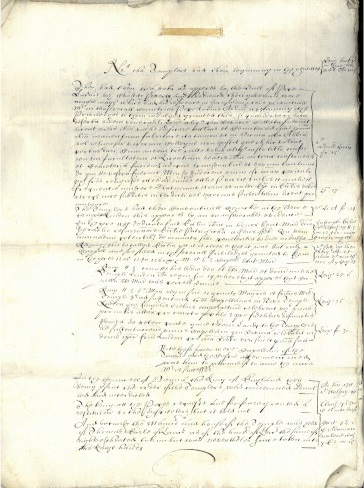
A paper tracing the history and titles of the Temple and its Masters from the year 1119, c.1630 (MT/15/TAM/55)
Dr Micklethwaite’s complaints covered matters of precedence, profit and jurisdiction. The Master’s belief in the societies’ obligation to welcome him into Hall was next in his list of objections, with later specific complaints about being disrespected by officers of the Inner Temple and their message to ‘forbear to come into the hall at meal times’. He also believed that he was due tithes that he had not received; was due a certain amount of money from every fellow in the Inns that had not been fully received; that no house or mansion had been provided for him contrary to the societies’ obligations in the letters patent; that they had allowed the buildings in Parsons Court, for which he received rents, to fall into disrepair and for the gentlemen to assign over their chambers to one-another without his permission; denied his authority in ecclesiastical jurisdictions with particular reference to gentlemen “delinquent in causes ecclesiastical” and that they denied him access to the Buttery Books so he could compare them to his lists of Communicants; they had meetings in Church and didn’t inform him when they did so; and that they did not pay him for sermons outside of certain Sundays and holidays.
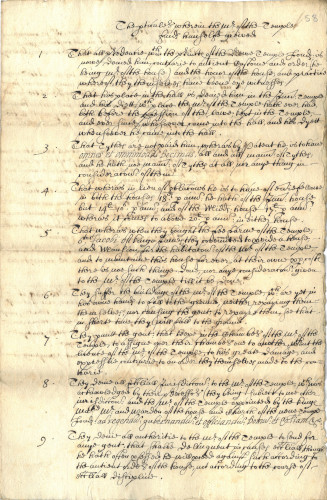
List of fifteen particulars in which Doctor Micklethwaite felt aggrieved and the Middle Temple’s answers to them, c.1630 (MT/15/TAM/58)
The King heard the case between the societies and Doctor Micklethwaite and was particularly concerned with the Master's objections pertaining to his authority in ecclesiastical jurisdictions. One of the primary causes of the English Civil War (1642-1651) was Charles I’s enforcement of doctrines of the pre-Reformation Church, the precursor to ‘high church’ views, contrary to the increasingly popular Calvinist Protestant ideas spreading throughout the country. He enforced these ideas with the assistance of the Archbishop of Canterbury, William Laud, and Doctor Micklethwaite also gained preferment through espousing these same ideas. In a letter from William Laud, then Bishop of London, to the Benchers of the Inn on 10 December 1633, he writes that ‘The King has remarked that the ecclesiastical laws and the constitutions which are settled by authority in their church are particularly significant because very many of the gentry spend part of their time in one of the Inns of Court before returning to govern as justices in their several counties, and they are guided by the practice they see upheld in the Temple Church’. Laud then continues to instruct that the entire service from the Book of Common Prayer be read before the sermon without alteration and that the preacher confine the content of the sermon to ‘the bounds of doctrine and discipline of the Church of England’. Laud’s instructions imply that there had been some clashes between Doctor Micklethwaite and the more Puritanical elements of the two Inns.
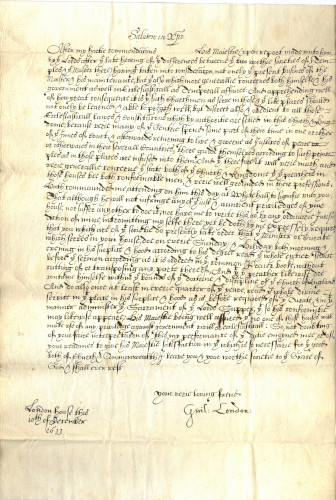
Letter from William Laud, Bishop of London, to the Benchers and Members of the Middle Temple and the Inner Temple, 10 December 1633 (MT/15/TAM/67)
The dispute was settled by order of the Lords in Council in the Star Chamber on 16 May 1634. However, in 1637 there were further deteriorations in the Inn’s relationship with the Master and tensions reached the surface once again. In the minutes of Middle Temple’s Parliament of 27 October 1637, it was recorded that he had presented the Benchers with bills for various works and alterations in the Church amounting to £90 9s 11d, a very large sum of money at the time, which the Benchers refused to pay. The Master also locked up the church outside of service times, objecting to the ‘profanation’ of the Church by the Inns who frequently used it as a place of business and pleasure – one of the complaints in his original list of objections that had not been resolved to his satisfaction. The Benchers of the Inner Temple retaliated by having other keys made and ‘throwing open’ the Church. Doctor Micklethwaite’s ire was provoked, and he again petitioned the King stating that the societies were reneging on their obligations under the articles of 16 May 1634 and the Lords of Council in the presence of the King on 27 May 1638 ordered that ‘all arrears if any exist, should be duly paid the Master’.
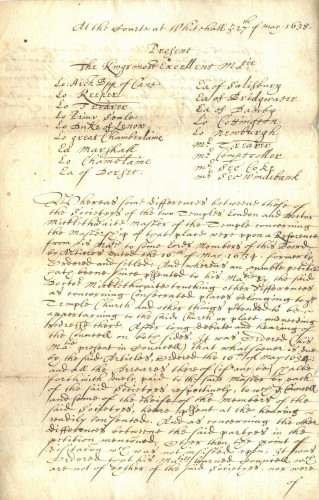
Extract order of the Lords of Council (the King being present), Whitehall, concerning the differences between the two Inns and Doctor Micklethwaite, 27 May 1638 (MT/15/TAM/75)
The outcome of the 1638 case was for the King to order that the Master have the rents from 20 chambers in Parsons Court, an additional payment of £31 10s from both houses, that he rent the Parsons Court chambers to the two Inns and that he receive £200 every term in rent, and when they build on Parsons Court they ‘make him a convenient lodging’. He was to preach every Sunday and be allowed the diet of two men. He was also to have the Buttery rolls delivered to him so that he could see who was in commons that did not receive Communion and was granted the right to give them private admonishment or allow the orders of the house to discipline them. He was also to be allowed to be present at discussions regarding the repair of the Church and the rights of his office were to be ‘preserved entire’.
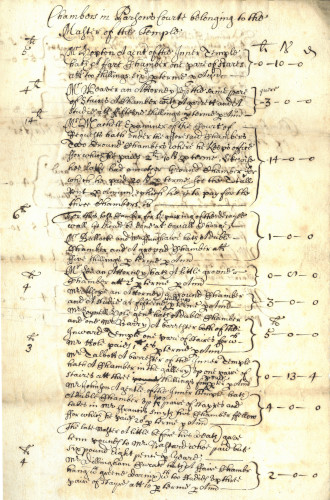
List of chambers in Parsons Court, including the names of occupants, and a description of rooms, studios and stairs in each, c.1634 (MT/15/TAM/70)
After a troubled tenure at the Temple, in 1639 it was thought that Doctor Micklethwaite might be appointed to the living of Sandy in Bedfordshire. However, he died on 7 August 1639, and Dr John Littleton was appointed his successor as Master of the Temple. On his death the contents of the Church were inventoried, providing us with a thorough list of the possessions of the Church at that time and showing the High Church preferences of the King and the Master in its emphasis on a decorated and ritualised altar. Dr Littleton would not survive many years as Master as the religious tensions that caused friction during the Mastership of Dr Micklethwaite exploded during the years of Civil War, with the ministry of Temple Church being sequestered away from him and given to a candidate with views that aligned more with the Parliamentarian faction that remained in London and in control of the Inn.
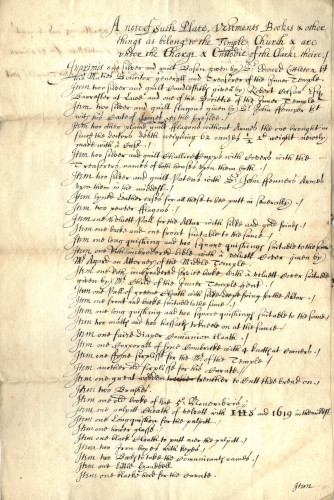
Inventory of items in Temple Church after the death of Doctor Micklethwaite, 1639 (MT/15/TAM/80)